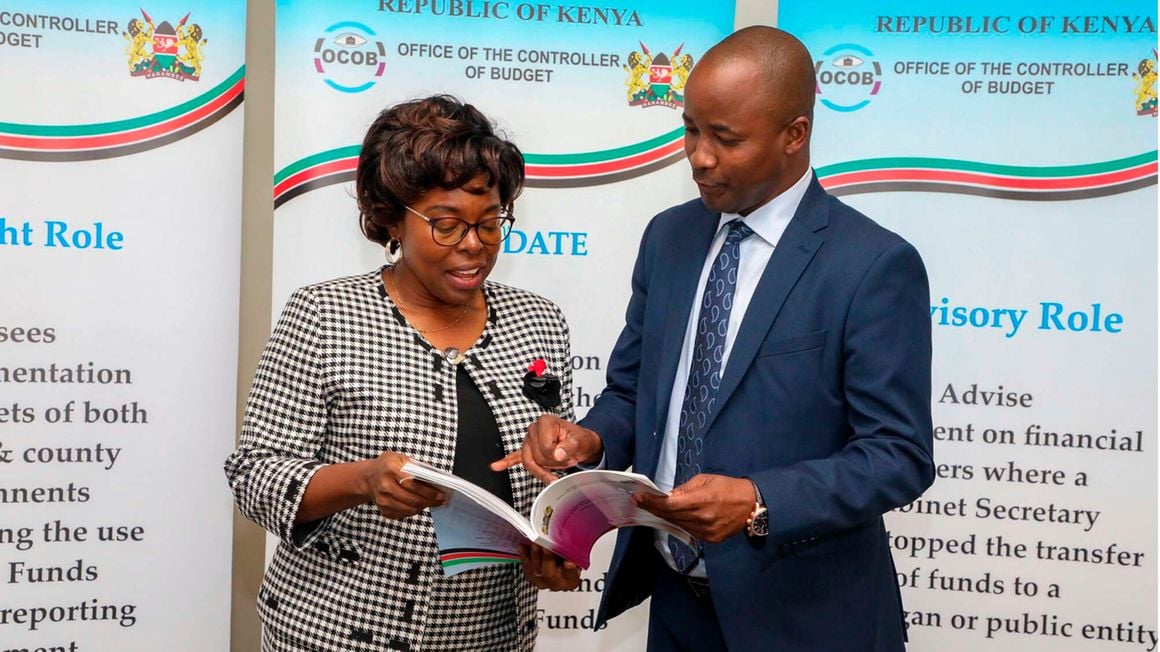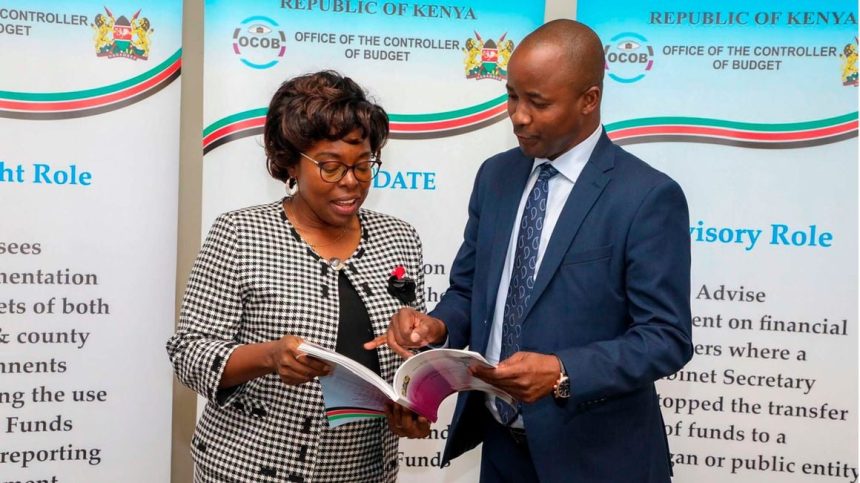State agencies are hiding money under line items for projects they will not implement, only to redirect the cash during supplementary budgets to fund unapproved projects, according to a report of the Controller of Budget (CoB).
Margaret Nyakang’o, the CoB, has also put President William Ruto’s administration on the spot for reallocating development expenditure in the last nine months, hurting budget absorption.
Dr Nyakango has found that ministries, departments and agencies (MDAs) exploited Article 233 of the Constitution to spend allocated funds for line projects without parliamentary approval.
Dr Nyakang’o says most spending agencies have misused the Constitution and the Supplementary Budget to reallocate funds to areas not funded in the approved Budget Estimates.
She said most agencies hide money in one line item and redirect the same during the supplementary budget to fund unapproved projects.
“There are a lot of irregular and illegal items that are introduced during the Supplementary Budget,” said Dr Nyakang’o.
“Some agencies put money somewhere in the main budget and during the Supplementary Budget, they reallocate the money to where they initially wanted. This is where corruption starts or takes place.”
The approved gross budget for the national government for the financial year 2022/23 amounted to Sh3.67 trillion but CoB’s report indicates that the Treasury issued Sh2.09 trillion in the first nine months of financial year 2022/23.

Dr Nyakang’o said development expenditure recorded an 18.9 percent decline from the Sh317.37 billion spent in the first nine months of 2021/22.
“A review of the recurrent expenditure shows that Sh399.96 billion was spent on personnel emoluments representing 40.6 per cent of the gross recurrent expenditure by ministries, departments and agencies,” she said.
“In the first nine months of financial 2022/23 covering the period July 2022 to March 2023, receipts into the Consolidated Fund amounted to Sh2.12 trillion, representing 56.8 percent of the revised net estimates of Sh3.61 trillion.”
The CoB now wants Parliament to strengthen the budgeting framework to plug a loophole where State agencies use supplementary budgets to sneak illegal expenditure, which leads to the loss of public funds.
Dr Nyakang’o said the projects funded under Article 223 of the Constitution and the Supplementary Budget are not subjected to parliamentary approval and public participation.
Article 223 of the Constitution allows the Treasury to spend on emergencies without the approval of Parliament.
The law demands that the Treasury table a mini-budget two months after withdrawing funds from the Consolidated Fund without the approval of MPs.
“This is extra-budget spending. There are people who saw a loophole. They go behind the budget and use Article 223 to finance items that were rejected during sector working group discussions,” said Dr Nyakang’o while releasing the National and County Government budget implementation review reports for the third quarter of the current financial year.
“Some government officials use political connections and friendship to sneak in items under Article 223 that failed through the sector working groups. This project failed at the public participation stage of the main budget estimates.”
Dr Nyakang’o said all items that are financed through the funds withdrawn without Parliament should be taken through public participation.
She said Article 223 should be tightened to ensure that it is only used to fund exceptional and unforeseen expenditures.
“There is a need to tighten the law to end the abuse of Article 223 of the Constitution. Article 223 is the real scourge and has been misused, Dr Nyakang’o said adding that all budget items of interest whether funded through Article 223 of the Constitution or Supplementary Budget should be taken through public participation.
“We need to strengthen our budgeting framework. There are frequent Supplementary Budgets that come in very soon after the main budget is passed,” she said.
“Article 223 of the Constitution has disorganised the way we budget. We need to reorganise the use of this constitutional provision.”
Dr Nyakang’o said the national government’s pending bill comprises Sh450.24 billion (85 percent) for State corporations and Sh79.29 billion (15 percent) for MDAs.
Read: Budget proposals that will hit you if effected as drafted
The State corporations’ pending bills include payments due to contractors, and suppliers, unremitted statutory and other deductions, and pension arrears for Local Authorities Pension Trust.
The report shows that the highest percentage of the State corporations’ pending bills (59.4 percent) belong to contractors who have undertaken projects.
“The MDAs’ pending bills are mainly historical pending bills comprising Sh58.22 billion (73.4 percent) for recurrent expenditure and Sh21.07 billion (26.6 percent) for development expenditure,” said Dr Nyakang’o.
At the county level, the CoB said she approved the withdrawal of Sh239.92 billion from the County Revenue Fund account during the first nine months of the financial year 2022/23.
“This amount comprised Sh28.88 billion or 12.04 percent for development programmes and Sh211.04 billion (87.96 percent) for recurrent programmes,” said Dr Nyakang’o.
“The total outstanding pending bills for county governments as of March 31, 2023, stood at Sh159.94 billion.”
Dr Nyakang’o attributed the low absorption of funds to delay by the National Treasury to disburse the equitable share of revenue to counties, under-performance of own-source revenue collection, low expenditure on the development budget and high level of pending bills.



